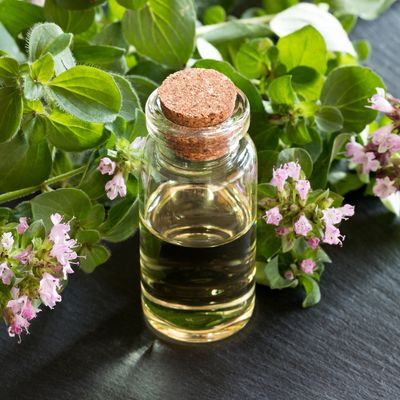
Over the winter holidays, I caught one of those ever-lasting colds — one that was so brutal that in a weakened state, I begged my few social-media followers for their go-to cures. Within ten minutes, I received three responses: one recommendation for holding a minute-long shoulder stand “at least four times a day,” and two for taking oregano oil. This wasn’t the first time I had heard someone pontificate about oregano oil’s alleged healing powers. By the time I received the two suggestions, I had already been considering it as a potential remedy — I was, even before the first day of my unbearable illness, ready to believe. So, prepared for it to fortify my immune system and protect me from future urinary tract infections or whatever else it’s supposed to do, I did a little brand research and bought an $8.99 bottle of mini softgels.
Immediately upon purchasing the supplements, I threw one back and waited. Half an hour passed. Then an hour. And, after two hours of periodically checking my aching neck and sore throat, I reluctantly came to the devastating conclusion, yep, still feel like I’m dying. Yet despite my disappointment, I instantly came up with excuses: Perhaps I didn’t really feel anything from the oregano oil, but to the cold’s credit, it was pretty ruthless, and my immune system was weak. The lack of any sort of identifiable effect also spurred a number of anxious thoughts that raced through my mind: Was I supposed to take this before getting so sick? Did I not take enough? Or … did I take it incorrectly?
One of the first people rumored to have touted the benefits of oregano was none other than the founder of modern medicine, Hippocrates, who reportedly prescribed it to people suffering from digestive and respiratory ailments. Since then, a handful of studies have supported the hypothesis that oregano oil has antiviral and antibacterial properties. One 2001 study, conducted by Georgetown University Medical Center, concluded that oregano’s primary active compound, carvacrol, could fight infection as effectively as traditional antibiotics. Given that carvacrol is used as a food additive, as it’s an inhibitor of bacterial growth, the study’s finding seemed legitimate; if it could fight bacteria in my food, it could presumably fight the bad bacteria in my body, or so I thought.
Some experts, as one might suspect, are skeptical. Kristin Kirkpatrick, the manager of Wellness Nutrition Services at the Cleveland Clinic Wellness Institute, pointed me toward what she considers a “promising” study on 34 essential oils from John Hopkins, which found that oregano was more effective at fighting Lyme disease than some some popular antibiotics. While I don’t have Lyme disease, my initial takeaway from this study was that oregano oil really must be powerful. However, Kirkpatrick noted, “We always need to consider whether the lab results, which are done in a controlled laboratory setting and can be done on animals, will reap the same results for the rest of us who may be using the oil in a variety of ways.”
“While the oil most likely won’t harm you — unless you are on multiple medications and the oil is mixed with other herbs — it’s not clear if it will significantly help you,” she continued. “Many of the studies point to carvacrol as the magic ingredient with all the benefits, but some studies suggest that it’s most effective against viruses as a hand sanitizer or disinfecting agent ingredient. It’s unclear if ingesting has the same impact.”
Though Kirkpatrick does acknowledge that the science behind oregano oil’s alleged powers is a little weak, she doesn’t unequivocally deny that it could help alleviate cold symptoms — it’s an appropriately skeptical stance that I appreciate. It’s the same one I have toward CBD gummies, passionflower, and probiotics, all of which I regularly buy because I was raised by a woman who instilled in me an irrepressible affinity for natural remedies. There may be little scientific research into oregano oil’s anti-viral and anti-bacterial properties — it hasn’t gotten nearly the same amount of attention as, say, echinacea — but I could simply interpret this to mean that the scientific community simply hasn’t yet come around to its beneficial properties.
I’m not sure I’ll buy more oregano oil when my stock depletes, but seeing as I’ll readily spending $60 on CBD oil, I can easily imagine myself reserving a $10 bill for softgels. Really, my only problem with oregano oil is that it just isn’t fun. I shill out an embarrassing amount of money on weird powders that supposedly make me hotter and tinctures that ease me into a pleasant fugue state, but in buying oregano oil, I’m accepting that my immune system will yet again fail me in the future. I guess it’s a good thing I sprung for the 60-count bottle — that’ll last me, I hope, for at least a few years.
Now, all I’m wondering about is whether these things expire.

